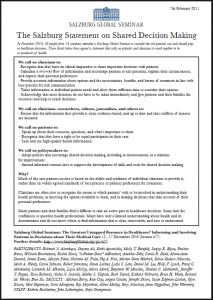March 30th, 2011 by DavedeBronkart in Health Policy, News
No Comments »

 Last Thursday at the headquarters of the British Medical Journal in London, an important announcement will be made about patients’ rights to be actively involved in decisions about their treatment. Below is the press release about it.
Last Thursday at the headquarters of the British Medical Journal in London, an important announcement will be made about patients’ rights to be actively involved in decisions about their treatment. Below is the press release about it.
The subject is shared decision making, which we’ve been posting about recently (series here; initial post here.) Developed by the participants in a Salzburg Global Seminar last December, the document is called the Salzburg Statement. The pivotal distinction here is the difference between informed consent, in which the physician assesses the options and selects one, and gets your consent to do it; and informed choice, in which clinicians tell you the options, with all the pros and cons, and let you choose, based on your preferences.
Click the image to download. (It’s an A4 PDF; to print, those using letter size paper should select “Page Scaling: Fit.”)
Here’s today’s press release: Read more »
*This blog post was originally published at e-Patients.net*
March 2nd, 2011 by Jessie Gruman, Ph.D. in Better Health Network, Opinion
1 Comment »

 The other day I came across this photo of a couple clasping each other in a dramatic tango on the cover of an old medical journal — a special issue from 1999 that was focused entirely on doctor-patient partnership. The tone and subjects of the articles, letters and editorials were identical to those written today on the topic: “It’s time for the paternalism of the relationship between doctors and patients to be transformed into a partnership;” “There are benefits to this change and dangers to maintaining the status quo;” “Some doctors and patients resist the change and some embrace it: Why?”
The other day I came across this photo of a couple clasping each other in a dramatic tango on the cover of an old medical journal — a special issue from 1999 that was focused entirely on doctor-patient partnership. The tone and subjects of the articles, letters and editorials were identical to those written today on the topic: “It’s time for the paternalism of the relationship between doctors and patients to be transformed into a partnership;” “There are benefits to this change and dangers to maintaining the status quo;” “Some doctors and patients resist the change and some embrace it: Why?”
Two questions struck me as I impatiently scanned the articles from 12 years ago: First, why are these articles about doctor-patient partnership still so relevant? And second, why did the editor choose this cover image?
I’ve been mulling over these questions for a couple days, and I think an answer to the second question sheds light on the first. Here are some thoughts about the relationship between patients and doctors (and nurse practitioners and other clinicians) evoked by that image of the two elegant people dancing together:
It takes two to tango. Ever seen one guy doing the tango? Nope. Whatever he’s doing out there on the dance floor, that’s not tango. Without both dancers, there is no tango. The reason my doctor and I come together is our shared purpose of curing my illness or easing my pain. We bring different skills, perspectives and needs to this interaction. When in a partnership, I describe my symptoms and recount my history. I talk about my values and priorities. I say what I am able and willing to do for myself and what I am not. My doctor has knowledge about my disease and experience treating it in people like me; she explains risks and tradeoffs of different approaches and tailors her use of drugs, devices, and procedures to meet my needs and my preferences. Both of us recognize that without the active commitment of the other we can’t reach our shared goal: To help me live as well as I can for as long as I can.
Each dancer adjusts to his or her partner. In tango, each partner has different moves; the lead shifts subtly and constantly between them throughout the dance. In a partnership, when I am really ill, I delegate more decisions to my physicians; when I am well we freely go back and forth, discussing treatment options and making plans. Read more »
*This blog post was originally published at CFAH PPF Blog*
February 18th, 2011 by GarySchwitzer in Health Policy, Opinion
No Comments »

This is a guest column by Ivan Oransky, M.D., who is executive editor of Reuters Health and blogs at Embargo Watch and Retraction Watch.
 One of the things that makes evaluating medical evidence difficult is knowing whether what’s being published actually reflects reality. Are the studies we read a good representation of scientific truth, or are they full of cherry-picked data that help sell drugs or skew policy decisions?
One of the things that makes evaluating medical evidence difficult is knowing whether what’s being published actually reflects reality. Are the studies we read a good representation of scientific truth, or are they full of cherry-picked data that help sell drugs or skew policy decisions?
That question may sound like that of a paranoiac, but rest assured, it’s not. Researchers have worried about a “positive publication bias” for decades. The idea is that studies showing an effect of a particular drug or procedure are more likely to be published. In 2008, for example, a group of researchers published a New England Journal of Medicine study showing that nearly all — or 94 percent — of published studies of antidepressants used by the FDA to make approval decisions had positive results. But the researchers found that when the FDA included unpublished studies, only about half — or 51 percent — were positive.
A PLoS Medicine study published that same year found similar results for studies long after drugs were approved: Less than half — 43 percent — of studies used by the FDA to approve 90 drugs were published within five years of approval. It was those with positive results that were more likely in journals.
All of that can leave the impression that something may work better than it really does. And there is at least one powerful incentive for journals to publish positive studies: Drug and device makers are much more likely to buy reprints of such reports. Such reprints are highly lucrative for journals. Read more »
*This blog post was originally published at Gary Schwitzer's HealthNewsReview Blog*
January 29th, 2011 by KevinMD in Health Policy, Opinion
No Comments »

I recently pointed to a BMJ study concluding that pay for performance doesn’t seem to motivate doctors. It has been picking up steam in major media with TIME, for instance, saying: “Money isn’t everything, even to doctors.”
So much is riding on the concept of pay for performance, that it’s hard to fathom what other options there are should it fail. And there’s mounting evidence that it will.
Dr. Aaron Carroll, a pediatrician at the University of Indiana, and regular contributor to KevinMD.com, ponders the options. First he comments on why the performance incentives in the NHS failed:
Perhaps the doctors were already improving without the program. If that’s the case, though, then you don’t need economic incentives. It’s possible the incentives were too low. But I don’t think many will propose more than a 25 percent bonus. It’s also possible that the benchmarks which define success were too low and therefore didn’t improve outcomes. There’s no scientific reason to think that the recommendations weren’t appropriate, however. More likely, it’s what I’ve said before. Changing physician behavior is hard.
So if money can’t motivate doctors, what’s next? Physicians aren’t going to like what Dr. Carroll has to say. Read more »
*This blog post was originally published at KevinMD.com*
January 22nd, 2011 by GarySchwitzer in Health Policy, Opinion
No Comments »

In a recent issue of the British Medical Journal (BMJ), journalist Ray Moynihan wrote: “Beware the fortune tellers peddling genetic tests.” (Subscription required for full access.) Excerpts:
“For anyone concerned about the creeping medicalisation of life, the marketplace for genetic testing is surely one of the latest frontiers, where apparently harmless technology can help mutate healthy people into fearful patients, their personhood redefined by multiple genetic predispositions for disease and early death.
…
Again a tool that’s proved useful in the laboratory has escaped like a virus into the marketplace, incubated by entrepreneurs, lazy reporters, and the power of our collective dreams of technological salvation, this time in the form of personalised medicine to treat us according to our individual genetic profiles.
…
Evaluating genetic tests is a complex business, requiring assessment of how well the test measures what it claims to measure, how well the genetic variation predicts actual disease, how useful the results are in terms of treatment, and what the social and ethical issues might be. Clearly there’s potential for exaggerating the value of a genetic test, which is one reason Germany has imposed severe restrictions on direct-to-consumer testing. In the United States they’re talking of a new test registry on a government website, raising immediate concerns that it could lend legitimacy to unproved and potentially harmful products. Read more »
*This blog post was originally published at Gary Schwitzer's HealthNewsReview Blog*
 Last Thursday at the headquarters of the British Medical Journal in London, an important announcement will be made about patients’ rights to be actively involved in decisions about their treatment. Below is the press release about it.
Last Thursday at the headquarters of the British Medical Journal in London, an important announcement will be made about patients’ rights to be actively involved in decisions about their treatment. Below is the press release about it.














